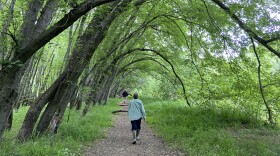
Dave Anderson
Host, Something WildNaturalist Dave Anderson is Senior Director of Education for The Society for the Protection of New Hampshire Forests, where he has worked for 30 over years. He is responsible for the design and delivery of conservation-related outreach education programs including field trips, tours and presentations to Forest Society members, conservation partners and the general public.
Dave guides field trips on conservation land statewide while teaching about forest ecology, wildlife ecology, forest stewardship and land conservation to introduce both life-long residents and visitors alike to protection and management of New Hampshire forests, farms and open space. His bimonthly column “Forest Journal” appears in the New Hampshire Sunday News, and his quarterly “Nature’s View” columns are a regular feature in the Forest Society’s quarterly magazine Forest Notes.
Dave lives on “Meetinghouse Hill Farm,” a 40-acre certified Tree Farm in rural South Sutton, New Hampshire. The farm includes vegetable and perennial flower gardens, laying hens, Romney sheep, fruit trees, mowed and grazed pastures and an actively-managed pine-oak-hemlock backyard woodlot.
-
The short-tailed weasel, or stoat, is native to New Hampshire and, while adorable, is a fierce predator.
-
Ice changes the landscape, and that’s especially true on beaver ponds.
-
It may not seem like it, but the days are slowly lengthening, and there are other glimmers in the winter landscape.
-
A listener asks why she is seeing moths flitting about at the coldest time of year.
-
Succession is a natural process, even at Something Wild, as Chris Martin retires and we meet a new host.
-
A visit to a magnificent urban tree, the sycamore, to admire its unique characteristics and ecological role.
-
Gino Ellison spent a year trying to see as many birds as possible, and has advice for how you can create your own Big Year.
-
As part of Project Owlnet, the Something Wild team observed northern saw-whet owls being banded to learn more about their migration.
-
Acorns and other nuts get all the attention in a mast year, but berries and fruits — 'soft mast' — are equally important for wildlife and forest ecosystems.
-
The American Kestrel, a tiny, colorful raptor, is declining in the state, and the Harris Center for Conservation Education is installing nest boxes in hopes of bolstering local kestrel populations.











